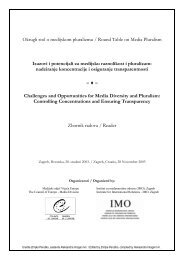almanac on security sector oversight in the Western Balkans
almanac on security sector oversight in the Western Balkans
almanac on security sector oversight in the Western Balkans
You also want an ePaper? Increase the reach of your titles
YUMPU automatically turns print PDFs into web optimized ePapers that Google loves.
Reform deteriorated <strong>in</strong> <strong>the</strong> next period (1995-1999). The agent of that reversal of fortune<br />
was undoubtedly <strong>the</strong> political elite, which brought itself and society more and<br />
more at odds with <strong>the</strong> <strong>in</strong>ternati<strong>on</strong>al community. This was fostered by a tighten<strong>in</strong>g grip<br />
<strong>on</strong> society. The legal framework, however, c<strong>on</strong>t<strong>in</strong>ued to be updated and adjusted and<br />
<strong>the</strong> levels of adm<strong>in</strong>istrative capacities were ma<strong>in</strong>ta<strong>in</strong>ed.<br />
The third period, 2000-2003, saw <strong>in</strong>cremental improvement of reform apart from <strong>in</strong>ternalisati<strong>on</strong><br />
of values. Credit, aga<strong>in</strong>, goes to political elites: this time <strong>the</strong> SDP, and<br />
its <strong>in</strong>fluence <strong>on</strong> <strong>the</strong> development of <strong>the</strong> reform processes. This was <strong>the</strong> time when<br />
accessi<strong>on</strong> to NATO and <strong>the</strong> EU were started. This third period also was marked by dramatically<br />
<strong>in</strong>creas<strong>in</strong>g <strong>in</strong>stituti<strong>on</strong>al and adm<strong>in</strong>istrative capacities. Also, serious attempts<br />
to close <strong>the</strong> gap <strong>in</strong> regulatory quality were undertaken. There was an emphasis <strong>on</strong><br />
higher levels of f<strong>in</strong>ancial accountability. Civil society f<strong>in</strong>ally started to take its place <strong>in</strong><br />
oversee<strong>in</strong>g activities of <strong>the</strong> state.<br />
Blame for <strong>the</strong> latter needs to be put <strong>on</strong> <strong>the</strong> most rigid parts of society, mostly related<br />
to veteran groups, etc. facilitated by <strong>the</strong> <strong>the</strong>n right w<strong>in</strong>g parliamentary oppositi<strong>on</strong>.<br />
The fourth period, 2004-2007, was marked by HDZ’s return to power. While some processes,<br />
like build<strong>in</strong>g adm<strong>in</strong>istrative capacities, improv<strong>in</strong>g laws, <strong>in</strong>fluence of external<br />
factors, <strong>in</strong>creas<strong>in</strong>g importance and <strong>in</strong>fluence of civil society and improv<strong>in</strong>g transparency,<br />
could not be stopped or reversed, some o<strong>the</strong>rs suffered. This was most true for<br />
<strong>the</strong> stalemate <strong>in</strong> <strong>in</strong>ternalisati<strong>on</strong> of values that was subjected to <strong>the</strong> previous obstacle.<br />
Most importantly, this is <strong>the</strong> period when most of <strong>the</strong> current corrupti<strong>on</strong> and procurement<br />
scandals started. Aga<strong>in</strong>, <strong>the</strong> ma<strong>in</strong> cause of reversal was political <strong>in</strong>fluence<br />
exerted by strategically scattered politicians and officials.<br />
The present period, 2008-2011, is probably <strong>the</strong> most important <strong>in</strong> <strong>the</strong> history of <strong>in</strong>dependent<br />
Croatia. At last, most irregularities have come to a head, many of <strong>the</strong>m<br />
be<strong>in</strong>g discovered, <strong>in</strong>vestigated, and prosecuted. This led to a completely new view<br />
am<strong>on</strong>g <strong>the</strong> general public about <strong>the</strong> way policies are be<strong>in</strong>g framed and pursued and<br />
<strong>in</strong> general, despite relative gloom and despair related to <strong>the</strong> ec<strong>on</strong>omic situati<strong>on</strong> and<br />
f<strong>in</strong>ancial crisis, it has helped to build high expectati<strong>on</strong>s am<strong>on</strong>g citizens. Any future<br />
government, if reas<strong>on</strong>ably resp<strong>on</strong>sible, can use this as a build<strong>in</strong>g block <strong>on</strong> which it<br />
could start fur<strong>the</strong>r development of <strong>the</strong> society and state.<br />
While most processes (eight out of n<strong>in</strong>e) show improvement, <strong>the</strong> <strong>in</strong>fluence of external<br />
factors, namely <strong>the</strong> <strong>in</strong>ternati<strong>on</strong>al community and its <strong>in</strong>fluence <strong>on</strong> fur<strong>the</strong>r state adm<strong>in</strong>istrati<strong>on</strong><br />
and <strong>security</strong> <strong>sector</strong> reform, shows deteriorati<strong>on</strong>. However, for <strong>the</strong> first time<br />
this is an issue where <strong>the</strong> most rigid and c<strong>on</strong>servative parts of society, mostly focused<br />
around veteran groups and small far right political parties, are at odds not <strong>on</strong>ly with<br />
<strong>the</strong> rest of society but also with <strong>the</strong> political ma<strong>in</strong>stream. Processes reviewed can be<br />
grouped <strong>in</strong>to four streams:<br />
• First, <strong>the</strong> most successful: build<strong>in</strong>g adm<strong>in</strong>istrative capacities and improvements to<br />
<strong>the</strong> legal framework.<br />
96



